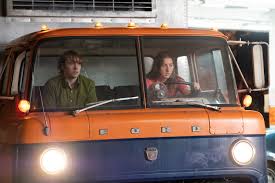Licorice Pizza, the latest from director Paul Thomas Anderson, returns to the terrain of the San Fernando Valley, the setting of many of his movies. Anderson's filmography is coming into focus as a history of California from the burgeoning oil field days of There Will Be Blood to the millennial unease of Magnolia. Licorice Pizza is set around the late Nixon era of 1973-74, the oil crisis figures into one of the vignettes. The film stars newcomer Copper Hoffman as 15-year-old Gary Valentine, an aspiring actor and entrepreneur. Alana Haim plays "Alana Kane", an aimless 20-something exploring various paths to life. Neither nostalgic nor revisionist, Anderson seemingly cobbled together a litany of '70s Valley lore in a film about youth, boredom, and creativity.
Gary's a highly motivated extrovert with self-sabotaging tendencies, a character out of Mark Twain transplanted to the 20th Century. He's a child actor transitioning to teen roles, while also trying to launch small businesses, including a waterbed store. His "meet cute" with Alana who volunteers at his High School, the both strike a chemistry despite their age difference - an issue the film goes to great lengths to tread carefully (not to the satisfaction of many reviewers). Alana and Gary form a friendship, she helps Gary with his business ventures (skillfully driving a delivery truck) to working on a political campaign. Anderson loves to center his movies around intense relationships, whether it's between two men in The Master or the May-December romance in Phantom Thread, and Licorice Pizza is no exception.
A colorful tapestry of the era is painted with many notables appearing including Bradley Cooper, Tom Waits, and Sean Penn making memorable appearances. Their roles draw upon Hollywood mythology, I can imagine Anderson being privy to the endless anecdotes he surely heard growing up in the valley (his father Ernie Anderson was a fixture of early television). The script and pacing of the film bear their influences from the lo-fi mode of The Rockford Files and the sun-drenched California of Hal Ashby's Shampoo. But I don't read Licorice Pizza as nostalgic per se. It's more like a time machine trip, witnessing a little of everything including the rough hewn edges, as a subplot alluding to Taxi Driver makes clear. Those seeking definitive statement about the 1970s will be disappointed, instead Anderson returned to the familiar confines of the Valley as an exploration of memory and mythmaking.

